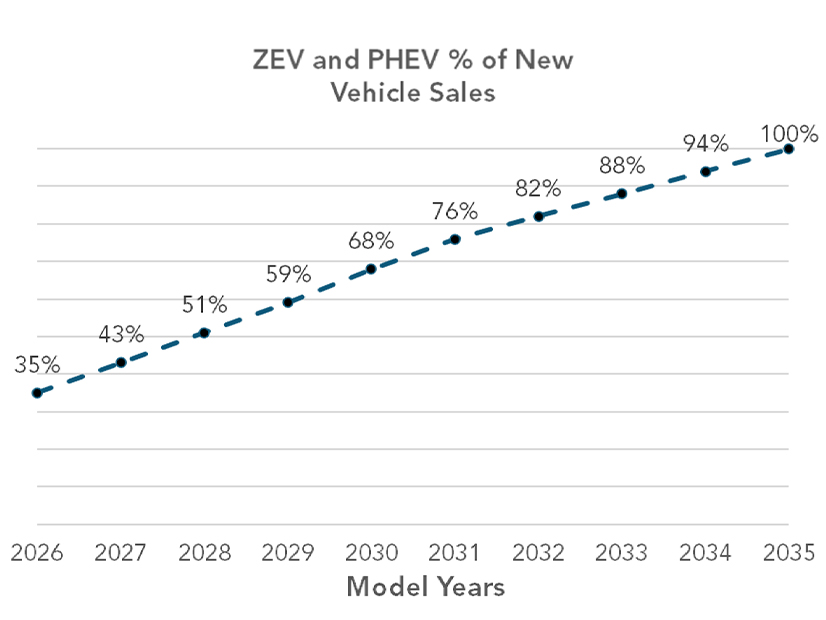
The California Air Resources Board has released a new draft of its proposed Advanced Clean Cars II regulation featuring a faster ramp up to 100% zero-emission vehicle (ZEV) sales in 2035 than an earlier draft of the rule.
The new version of the regulation would require 35% of new car sales in the state to be ZEVs in 2026. ZEV sales percentages would increase in each subsequent year, climbing to 43% in 2027 and 51% in 2028, before reaching 100% in 2035 and beyond.
A December 2021 draft of the regulation included a 26% ZEV sales requirement in 2026, followed by 34% in 2027 and 43% in 2028. The previous draft and the new version list the same ZEV sales percentages from 2031 through 2035, starting with 76% in 2031.
CARB released the new draft regulation on Tuesday and scheduled a public hearing on the proposed rules for June 9. Written comments may be submitted from April 15 through May 31, or during the public hearing.
‘Significant Milestone’
The proposed Advanced Clean Cars II regulation is a follow-up to CARB’s current Advanced Clean Cars rule.
The regulation consists of two programs. The ZEV program requires an increasing percentage of light-duty car and truck sales in the state to be zero-emission each year. The second component is the low-emission vehicle program (LEV), which sets standards for tailpipe emissions of greenhouse gases and smog-forming pollutants.
The current Advanced Clean Cars regulation sets a ZEV sales requirement of 22% in 2025. This year, the requirement is 14.5% ZEV sales.
Don Anair with the Union of Concerned Scientists called the new draft regulation a significant milestone for California as it’s the first regulatory proposal to bring the state to 100% ZEV sales by 2035. Anair is the research and deputy director for the Clean Transportation Program at UCS.
UCS had criticized the slower ramp up toward 100% ZEV sales requirement in last year’s proposal, saying that ZEV sales trends and automaker announcements showed that a more stringent regulation was feasible. And a faster ramp-up is needed to combat climate change, the group said.
Anair told NetZero Insider Wednesday that the more stringent ZEV requirements in the new proposal are “a significant improvement.”
In addition, Anair said that assurances in the proposed regulation — including battery labeling and warranty requirements — would bring more confidence to the used ZEV market.
EJ Credits Proposed
The regulation’s proposed environmental justice credits are another positive, Anair said, although he noted the voluntary credits don’t guarantee that more ZEVs will be provided to disadvantaged communities.
The environmental justice credits, which were first proposed last year, offer additional ZEV credits to car manufacturers that provide a new ZEV at a discount to a qualifying community-based clean mobility program. The discount must be 25% or more of the manufacturer’s suggested retail price. The credits would be available for model years 2026 through 2031.
CARB’s new proposal also retains a plan discussed last year to allow the transfer of credits from out-of-state ZEV sales.
If a car manufacturer earns more credits than required in a state that has adopted California’s ZEV program, those excess credits could be transferred to another state to make up a credit shortfall. The transfer would be limited to the number of credits needed to satisfy the deficit, and the transfers would only be allowed for model years 2026 through 2030.



